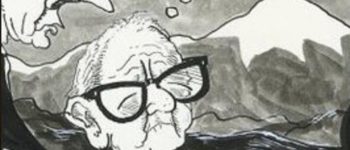1973: Labour 3.0 on Justice
August 13, 2019
By AHNZ
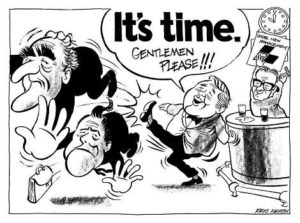 Labour 3.0 won the 1972 election in a landslide, kicking National 2.0 into the shabby opposition accommodations after a 12-year run in office. Short as it was, Prime Minister Norman Kirk didn’t live long enough to see this one-term wonder thrown out of office.
Labour 3.0 won the 1972 election in a landslide, kicking National 2.0 into the shabby opposition accommodations after a 12-year run in office. Short as it was, Prime Minister Norman Kirk didn’t live long enough to see this one-term wonder thrown out of office.
Part of what probably gave Kirk his fatal heart attack (and certainly doomed Labour 3.0) was his frenemie and Minister of Justice, Dr. Martyn Finlay. Kirk was a Social Conservative, Finlay a Social Radical. One of the last things the old man (Finlay, 65yo) did before the 1975 election was grant convicted criminals in prison the right to vote in the same. This did not enhance Labour 3.0’s popularity with the voters (except prisoners, of course) and helped seal their doom.
Dr Martyn Finlay
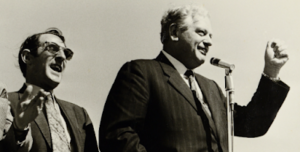 Born in Dunedin in 1912, little Martyn never knew his dad but was raised in a communal environment presided over by his mother. Their home became a boarding house where Finlay lived while he worked his way up to being a high-flying international legal academic. In 1939, Doctor Finlay returned to New Zealand to be a staffer to Superminister of Everything Rex Mason. Mason was the brutal Minister of Justice with a the high-pitched voice that allegedly killed chief bureaucrat Thomas Mark right there in his office (see 1941: Defiant Bureaucrat Killed in Minister’s Office.) Finlay couldn’t have been far away.
Born in Dunedin in 1912, little Martyn never knew his dad but was raised in a communal environment presided over by his mother. Their home became a boarding house where Finlay lived while he worked his way up to being a high-flying international legal academic. In 1939, Doctor Finlay returned to New Zealand to be a staffer to Superminister of Everything Rex Mason. Mason was the brutal Minister of Justice with a the high-pitched voice that allegedly killed chief bureaucrat Thomas Mark right there in his office (see 1941: Defiant Bureaucrat Killed in Minister’s Office.) Finlay couldn’t have been far away.
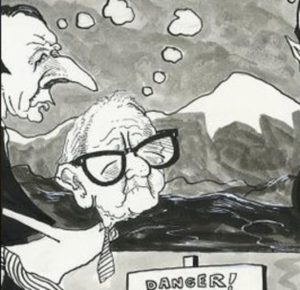
From the 1960s, Finlay had his own seat in parliament. Throughout the 1950s he championed a range of r-selected causes very familiar to us in 2019 and served as Labour’ Party President. Doc Finlay worked to loosen up abortion law, give more rights to homosexuals, and to reform divorce law to make ending marriages easier. Finlay set a bad example at the time in divorcing his wife publicly and inamicably. Finlay also championed the Viet Cong and led the way in protesting nuclear testing at Muroroa. Being the MP for Henderson, Finlay probably helped close the deal on the The West Auckland Booze Monopoly Cartel since prohibition is such a popular liberal cause. All in all, a Social Justice Warrior God that looked like Mr Magoo and had pro-level legal credentials.
Labour 3.0 Minister of Justice
Now in power, Finlay got to work making changes to the prison system. Home Leave was extended to all minimum-security inmates and some of the medium-security as well. Finlay changed things so these convicted criminals could have 72 hours freedom in every 2 month period. The number of criminals on Home Leave quadrupled but Finlay’s scheme had to be wound back after applicants used the opportunity to commit more crimes¹.
No need to pass any laws, “Uncle Martyn” (as convicts came to call their protector) used his Ministerial powers to make these changes. Along with expanding Home Leave, he privileged minimum-security crooks with regular out-bound phone calls. He expanded sentence remission so prisoners could be released earlier. Uncle Martyn allowed prisoners to write to him uncensored but when his replies were published in the newspapers he was made a fool of for dissing his own penal system. Back in 1968, Finlay is alleged to have declared ‘that no prison should be designed to eliminate the possibility of escape.’² Such sentiments alienated Uncle Martyn’s own Corrections staff and his fellow Labour 3.0 executive along with, as it would turn out, the New Zealand voters.
Uncle Martyn did change statue law to affect his agenda too though. He lowered the non-parole period for murder from 10 to 7 years. He lowered parole eligibility to the lesser of 3.5 years or half the prisoner’s full sentence. Perhaps most famously, Uncle Martyn passed the Electoral Amendment Act (1975) which enfranchised convicts to vote in New Zealand elections for the first time in history.
Pendulum of New Zealand Crime
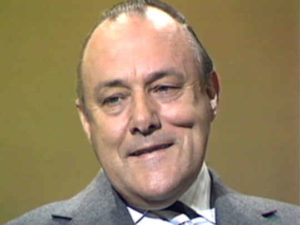 Martyn’s enfranchisement movement within the Government did not give many public reasons for its decision. When National 3.0 came to power it had no moral reasons against it either but sent Uncle Martyn’s exit gift to criminals to the legislative shredder. (It’s a shame New Zealand’s depth of civic debate is so low that we can’t decide such important things using principles.) Practical reasons were given, however, such as how unfair to electorates with jails in them it would be. Or, how problematic it would be if convicts could simply choose which electorate to vote in at whim. Suppose they all decided to pool their votes to one electorate to get some favoured criminal elected to parliament or a city’s mayoralty?³
Martyn’s enfranchisement movement within the Government did not give many public reasons for its decision. When National 3.0 came to power it had no moral reasons against it either but sent Uncle Martyn’s exit gift to criminals to the legislative shredder. (It’s a shame New Zealand’s depth of civic debate is so low that we can’t decide such important things using principles.) Practical reasons were given, however, such as how unfair to electorates with jails in them it would be. Or, how problematic it would be if convicts could simply choose which electorate to vote in at whim. Suppose they all decided to pool their votes to one electorate to get some favoured criminal elected to parliament or a city’s mayoralty?³
As usual, it wasn’t long before the pendulum swung back to going ‘soft’ on crime again. National 4.0 gave back some of Martyn’s Gift in 1993 but National 5.0 took it away again. Naturally enough, Labour 6.0 are working away again for a ‘soft’ on crime stance now in 2019. This has led Anarkiwi commentator Dan McGlashan to observe…
“New Zealanders in recent weeks have been astonished by some extremely soft sentences handed out to the perpetrators of some heinous crimes. Unfortunately, this isn’t just a handful of fluke occurrences, but the product of a calculated strategic shift. This essay describes how and why the Sixth Labour Government is trying to abolish prisons.”- Ref. The Labour Government is Trying to Abolish Prisons by Stealth; VJM Publishing
It’s hard to disagree with the Anarchist when the news of the week is..
“The urgent report, released on Monday, called specifically the section of the Electoral Act 1993, which disqualifies a person detained in prison from voting, to be repealed.”- Waitangi Tribunal calls for urgent law change to allow prisoners to vote in 2020 election; Stuff
McGlashan fears vigilante justice, blood feuds, and revenge attacks if the Finlay Paradigm is revived. Having seen this cycle play out about half a dozen times in New Zealand history already I’m far less worried. The r-selected overhaul will only go so far before enough K-selected people get angry and swing the pendulum back the other way again. Then as now, in the Anarchist History of New Zealand.
Note: Dr Finlay killed himself in 1999 at the age of 87.
—
Ref. The Problem of Prisons; Newbold (2007)
1 Especially in December 1974 when one man on Home Leave murdered his wife and then killed himself; Bad publicity. Ref. ibid
Image ref. Inspirational Radicalism; bowalleyroad.blogspot.com
2 ibid
3 Ref. THE RIGHTS OF PRISONERS TO VOTE: A REVIEW OF PRISONER DISENFRANCHISEMENT IN NEW ZEALAND; Greg Robins (2006)
Image ref. Deighton; Auckland Star (1973); National Library
 Like Comment Share
Like Comment Share

